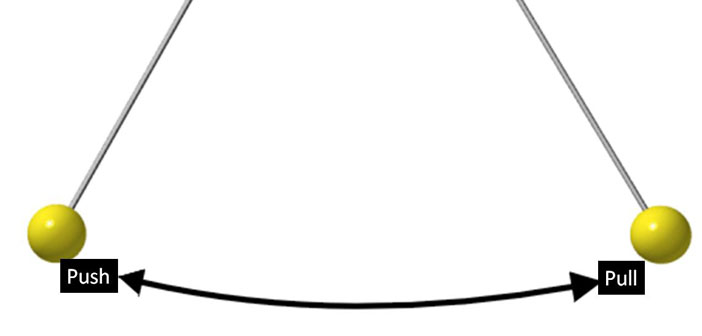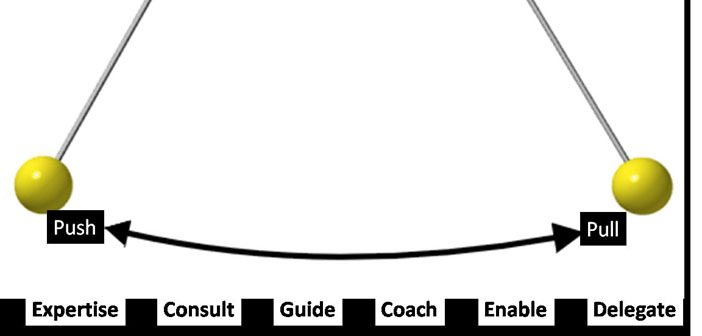What really is good coaching?
People often ask me this and why it’s so effective. I heard a vivid quote the other day, I just had to share with you,
“Good coaching is helping people to get out of their own way.”
That’s astute don’t you think?
The responsibility lies with the coachee
When my son Euan was younger, he played for a junior rugby team and I helped to coach them alongside other keen and enthusiastic dads.
We were a reasonable team, not brilliant; I think the quality of the coaches was also in question. But we sought ways to improve. Serendipity provided the answer. Let me explain.
At the club’s annual dinner, we were donated a rugby ball from Gloucester Rugby’s 2005 winning team. An actual match ball used by top players. You know; felt, passed and caught by real players. The ball went into the auction as the top prize.
Let me fast-forward the story. We won the ball in the auction.
Workplace coaching is all about flexibility and it’s knowing what part of the pendulum to be on for any given moment, is the true skill
I thought that’s it, at last we can play like winners, so I introduced the ball at our next training session and used it for the match against Kidderminster.
Did the ball make a difference? Not a bit. We lost handsomely.
A ball is not going to make any difference. Responsibility for performance lies with the players and the coaching team, we hadn’t improved and a new ball wasn’t going to make any transformation.
In the same way, responsibility in coaching lies with the coachee not the coach.
Do You Push or Pull in Coaching?
A good coach will move along the spectrum and be well paid if they do.
The spectrum is left to right – push and pull.

To push as a coach, you give but to pull, you encourage the actions to come from the client. Workplace coaching is all about flexibility and it’s knowing what part of the pendulum to be on for any given moment, is the true skill.
To help you, here’s the stages of the pendulum with the intervention to use.

The trick is to move along the spectrum gradually putting the responsibility for actions to the client.
Remember to Look for Leakage when Coaching
I read at the weekend about the famous rivalry between Boris Becker and Andre Agassi in the world of championship tennis. Agassi continually lost to Becker until he figured out his poker face. His body language “tell” for his serve.
Agassi learnt that when Becker stuck his tongue out to the left, he was going to serve wide, when his tongue was central, the serve went straight. This enable Agassi to win a long series of victories against Becker even though he deliberately lost serves to alleviate suspicion.

There’s a “tell” for everything with humans. Learn to read your customer’s physiology and you’ll be able to read minds. Here’s some reminders:
Peripheral vision. Rather than use your foveal vision which involves focusing on one spot, practice peripheral which allows you to gaze at the whole picture. That way you’ll pick up all the signals.
Calibrate normal. When you meet your customer or coachee, take a good look at their “normal” so when they “leak” you might spot an issue or problem that you can probe.
Body language. Re-learn the body signals. There’s some great work on this all over the internet. Google a guy called Alan Pease, he’s a master on the topic and rib ticklingly funny too.
Only upon his retirement in 1999 did Agassi confess. Naughty, but his skill earned him a lot of money. Remember, she with the greatest flexibility of behaviour, is the winner.
7 essential coaching questions
If you’ve ever wanted to capture some questions on a piece of paper to use during a coaching session, well here’s 7 essential ones:
- “What’s on your mind?”
- “What’re you taking away so far?”
- “What’s been most useful for you here?”
- “What’s the gold nugget here?”
- “What’s the first domino?”
- “And what else?”
- “Go on”
Worth keeping a note of in any coaching situation, these are worth their weight in gold.
10 Advanced coaching tips
Only use these if you wish to take your coaching to the next level.
- Coaches get paid well to move effortlessly across the pull – push spectrum and know when to do so with coaching clients. Pull uses questions and push means giving ideas and guidance.
- Don’t get too “hung up” about clients having all the answers – that’s nonsense. A good coach will have plenty of experience of the job involved and can come out of coaching mode to give ideas and suggestions. Just make sure your client knows you have moved outside of coaching temporarily to proffer proposals.
- If you give an idea to the client, suggest it’s just that and can be easily ignored if the client prefers. Some clients feel obliged to accept your offer especially if you hold rank over them.
- When your client gives you some actions they’re going to carry out, test that they are not just saying these to keep you happy especially if you hold rank. Try using the classic “out of 10, how likely are you to do that?”
- Calibrate your client immediately. Clock their default posture, facial expressions, eye contact, skin colour and voice tempo. Keep an eye out for any physiology “leakage” i.e. when you spot a change in the photo you took at calibration stage.
- Challenge any leakage that you see “I’ve noticed you seem a little uncomfortable?”
- If you’re using GROW and are exploring the Reality stage, try and dig a little deeper to assess their motivation and values around the goal not just tangible factors. Much of people’s motivation is down to their values and inner drive.
- In GROW, you may want to get to options quickly, but before you do so, explore any strategy behind the options to get a bigger picture. Chunk up any options “what’s that idea part of?”
- If you’re in a busy environment such as a hotel reception area, try to cloak the two of you and block out all sounds and distractions. Put any wall behind you to prevent movement distracting your client.
Have a rescue question or two up your sleeve. “where are you now?” or “what’s your next step” or “what’s on your mind right




